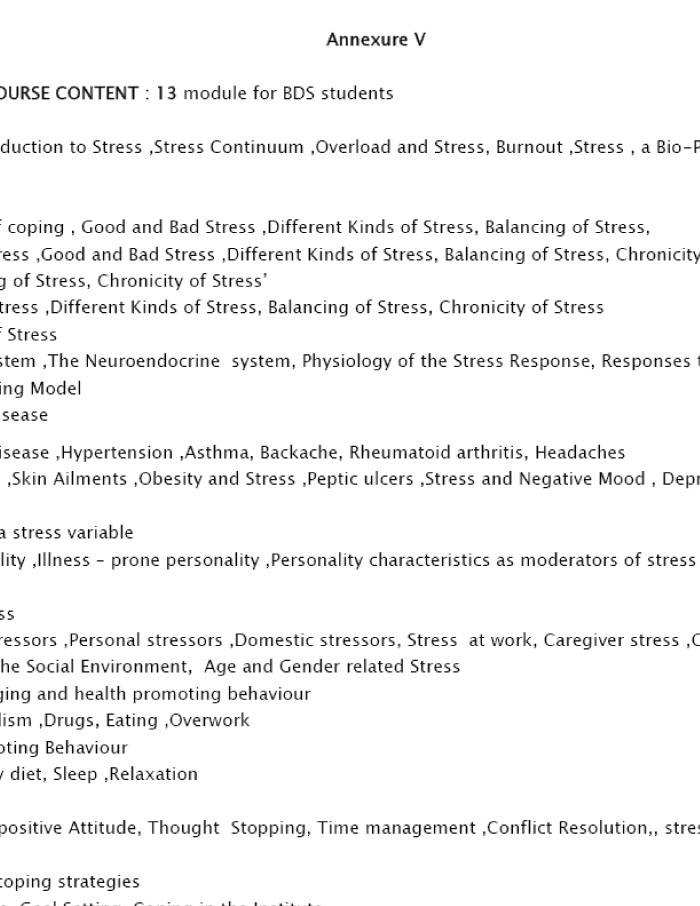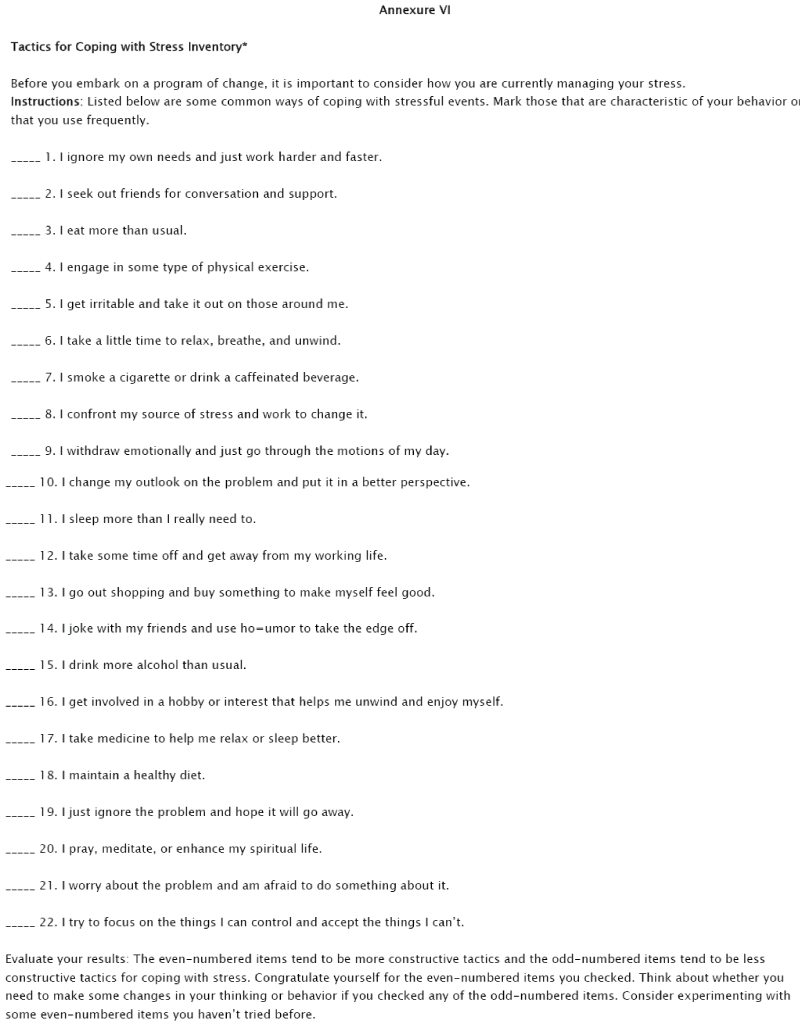ISSN: 2319-9865
ISSN: 2319-9865
Rajeev Saxena1, Ravi V Shirahatti2, Chinmay shah3*, Mukhit Kazi1, Ashwini Bhosale4, Ladkat A5, Devendra Panchawadkar5, and Shrikant Diwanay5
Department of Microbiology, Sinhgad Dental College and Hospital Pune, Maharashtra, India.
Department of Public Health Dentistry, Sinhgad Dental College and Hospital, Pune, Maharashtra, India.
Department of Physiology, Government Medical College, Bhavnagar, Gujarat, India.
College and Hospital Pune, Maharashtra, India.
Department of Pathology, Sinhgad Dental College and Hospital Pune, Maharashtra, India.
Received: 17 June 2013 Accepted: 01 July 2013
Visit for more related articles at Research & Reviews: Journal of Medical and Health Sciences
coping, stress, learning
The aim of Dental Curriculum is to produce a scientifically oriented, technically skilled, socially sensitive, professionally minded practitioner who adheres to high standards of professional conduct and ethics, who can function safely and effectively as a member of the health care system on graduation and throughout their professional career.
The same is expected from dental health professionals all over the world. This implies that dental students must be empowered to cope with the stress involved in the process of delivering these expectations. The stress coping skills is to be imparted as an essential part of the curriculum will qualitatively enhance their life which will in turn be reflected in their professional sphere. Before stress manages them they should be able to manage stress in positive manner.
The purpose is to develop a curriculum for “learning stress coping skills” for First Year UnderGraduate Dental students. It is proposed to implement this curriculum in the First year BDS course for a period of two months (13 modules -Table1) on every Saturday, for a duration of three hours. The time slot proposed is from 1.30 pm to 4.30 pm as thisslot is free of any other academic activity and hence available for this course. Permission of Head of the department and Principal will be obtained before commencement.
Being a Members of the “Curriculum Committee”and Chairperson of “Monitoring Attendance and Performance Committee” in my college, I will be able to propose this Curriculum to the Committees.I propose to develop this new curriculum based on the“Six Step Approach to Curriculum Development” byKern DE, Thomas PA and Huges MT, Curriculum development for medical education: A six step approach. 2nd Edition.John Hopkins University press, Baltimore. 1998.
It is widely accepted that medical school can be stressful.1−9 Since the late 1980s a growing number of medical schools and universities have offered students stress-reduction programs.10−14 More recently, schools such as Georgetown University, University of Maryland School of Medicine, Stanford University, and University of Massachusetts Medical School have incorporated or introduced the use of mind-body exercises into the curriculum to help students develop stress-reduction techniques.10,12 Although there is an individual optimal stress level that can enhance one”s performance, too much stress or test anxiety can also hinder an individual”s performance.15−17 Studies have revealed that being a student, not just a medical student, is stressful12,3 and that students” main concerns are academic performance and/or test anxiety.2,5,6,12,14,18−21 Test anxiety, a type of distress, has a physiological component. Research studies have found that elevations in corticosteroid levels (hormones released during times of distress) can impair declarative memory, concentration, and learning.22−26 Thus, high levels of stress can make it more difficult for students to concentrate and comprehend information.15 Consequently, students may have the cognitive ability yet perform poorly in testing situations due to stress or a resulting test anxiety interfering with their concentrationand ability to process information.27According to Harris and Coy,18 students should use diaphragmatic breathing during exams in attempts to calm or centre themselves. Results from research studies that examined students who meditated or used diaphragmatic breathing showed significant increases in students” academic learning and achievement.11,13,17,29 Diaphragmatic breathing is known to counteract the fight or flight response symptoms that are often associatedwith anxiety.15,30Meditation plays a important role in improving academic scores ,approximately 5 min of Deep Breathing Meditation (DBM); this was followed by a 1-hr lecture regarding the physiological effects of stress on learning and the body and results of experimental studies that utilized meditation to improve academic scores To our knowledge, only a limited number of medical schools provide opportunities to fully develop and use a stress reduction technique as a regular part of the curriculum for all students.11 However, it has been suggested in the literature that medical students be provided with educational interventions that teach them. Effective coping strategies as a proactive measure to counteract distress.5,7,12,32,33,36,37.
From an interaction with faculty as well as dental students, it is ascertained that Maharashtra University of Health Sciences, Nashik (MUHS), India, does not offer stress counseling, mentorship and psychiatric health care services to professional students. The syllabus of the MUHS Dental course also reflects the above deficiency. To confirm the above observation and to assess the general needs, we will conduct online “monkey survey” questionnaire.Moreover, students have no relief from stress as their grievances and concerns are not identified and addressed properly as there is no representation from the side of the students in the concerned committees. The following approach is proposed to reduce the stress level of dental students:
1. Stress Coping skills (SCS) to be included in the curriculum with immediate effect.
2. Representation of Dental students on theCollege Committees (minimum of 4 students).
3. Dental Students to join and participate in student and professional organizations.
4. Ensure early contact with Stress Coping Skills (SCS) and prevention and awareness of high risk behavior and symptoms of impairment.
5. Counseling / Psychiatric treatment facilities must be available within the college including accessibility and confidentiality.
6. Assist and follow up students who are experiencing difficulties.
7. College must deal with impaired students. For instance,alcohol addiction, drug abuse, mental illness etc.,
8. Remedial support to be provided for students. For instance,study skills, language support program.
9. Dental students to be protected from discrimination and hence the imperativeneed of Grievance Cells for students.
Medical education has deleterious consequences. Trainees (students, interns, and residents) suffer high levels of stress, which lead to alcohol and drug abuse,40 interpersonal relationship difficulties,41 depression and anxiety,42,43 and even suicide.44 Medical students have mean anxiety scores one standard deviation above those of non-patients, and their depression levels increase significantly throughout the first year of medical school.45 Stress may also harm trainees” professional effectiveness: it decreases attention,46 reduces concentration,47impinges on decision-making skills,48,49 and reduces trainees” abilities to establish strong physician–patient relationships. 50
Research has demonstrated that dental students experience considerable stress during their training51-54 and that dental students are more anxious than the general population.55 In addition, Kieser and Herbison56 found that second- and third year dental students reported being most anxious about surgical procedures and failed local anesthetic. Not only is this high anxiety concerning in its ownright, but it has been suggested that dental students” stress negatively impacts their physical and mental health.57,58 Of considerable concern, Newbury et al.54 reported that a significant number of second-year dental students utilized unsafe levels of alcohol (47 %) and illicit drugs (47 %). Further, dental students” anxiety predicts poorer academic performance51, and their anxiety might interfere with their performance during dental procedures. Research also suggests that dental students” anxiety exacerbates patients” distress during procedures55 O”Shea et al.59 reported various behaviors that can be used to decrease patient anxiety. These behaviors included having a calm manner, smiling, being friendly to the patient, and giving emotional support to the patient throughout treatment. However,an anxious dental student may have difficulty engaging in these behaviors. Given the negative impact that anxiety has on the students themselves, their academic performance, their dental work, and their patients” comfort level, it has been recommended that dental students be provided with a stress management program during their dental training52.
Targeted learners: First year BDS students of Sinhgad Dental College, Pune, Maharashtra, India.
Pre-test assessment will be conducted with the help of Dental Environment Stress Questionnaire on Likert”s scale to assess students stress levels. (Annexure I and II).The best time to conduct the survey would be in the beginning of First yearBDS.Being at the threshold of their college life, the students are fresh, enthusiastic and receptive. They probably do not have an accurate idea about the rigors of a professional course and what it demands from them. Hencelearning stress coping skills at the very beginning of their professional course will help them to identify and understand stress and furthermore vastly improve their preparedness in handling stress. Thus ability to cope with stress at an early stage of life would have a very strong positive impact on their mental and physical wellbeing which in turn would reflect in their attitude towards the course and patient care and in the long run their professional life.
David Kolb (1984) developed a theoretical framework “experiential learning” which can be used as a guide in designing learning objectives (Annexure III and IV)
Experiential Learning Cycles: Learning objectives include objective that relate to learning in the cognitive, affective and psychomotor domains which are as follows:
i. At the end of this (two months) course, the first year BDS students should be able to state clearly ten signs and ten symptoms of stress.(cognitive domain)
ii. At the end of this (two months) course, the first year BDS students should be able to list five stress coping skills (cognitive domain).
iii. At the end of this (two months) course, the first year BDS students should be able to demonstrate correctly five stress coping techniques (psychomotor domain).
iv. At the end of this (two months) course, the first year BDS students should be able to utilize two stress coping skills effectively for themselves (affective domain).
4. d.Educational strategies: Involves both content and methods.
• Stress coping Skills : 13 Modules (Annexure V)
• Interactive lecture
• Small group discussion
• Demonstration
• Role play
• Case Scenario
• Project assignment.
̢́̉ 30 % of the total course content will be delivered through interactive lectures.
̢́̉ Every interactive lecture will be of 1 hour and 30minutesduration.
̢́̉ In this session,1 hour will be of didactic lecture followed by the interaction of 30 minutes with the students.
̢́̉ 30 % of the total course content will be delivered through interactive lectures.
̢́̉ Every interactive lecture will be of 1 hour and 30minutesduration.
̢́̉ In this session,1 hour will be of didactic lecture followed by the interaction of 30 minutes with the students.
̢́̉ 20 % of the total course content will be delivered through Small group discussions.
̢́̉ Every Small group discussion will be of 1 hour duration.
̢́̉ Each small group will consist of 8 students with a facilitator.
̢́̉ 30 % of the total course content will be delivered through demonstrations.
̢́̉ Every demonstration will be of 1 hour duration.
̢́̉ A trained facilitator will demonstrate various stress coping techniques.
̢́̉ 10 % of the total course content will be delivered through role plays.
̢́̉ In one hour, six role plays will be conducted by the students with a facilitator.
̢́̉ Each role play will be of 5 min duration with inaction of real student life situations of stress. This will be followed by 5 min discussion.
̢́̉ 10 % of the total course content will be delivered through solving of the case scenario.
̢́̉ In one hour two case scenarios will be taken for discussion.
̢́̉ Case scenarios will be taken from the psychiatry case files in relation to the stress in medical student life.
̢́̉ Project assignments topics will be prepared as per the need of the dental students.
̢́̉ The project is to be completed within two months after the completion of course.
• Book series: Health and Lifestyle Management Series: Health Psychology & Stress Management. Lifetime wellness Rx International Ltd., (An Apollo Hospitals Group company), Plot No.35, Avenue 1, Sai Enclave, road No.12, Banjara Hills, Hyderabad, India, Pin – 500034.
• Course title: “Stress Management on the path to wellness” by Ease Village Access “PROS” Program curriculum
• Fresno Pacific University, Centre for Professional Development, HPT 910 – Stress Management; Instructor”s name: Andrew Herrick, Ph.D; Contact website:www.healthedcourses.com
• Textbook: David, M.Eshelman, E.R., &Mckay, M. (2008). The relaxation & Stress Reduction Workbook. (6th Ed.). Oakland, CA: New Harbinger Publications.
• Park”s textbook of Preventive and Social medicine.K.Park19 thedition – Mental health 684-691
• www.psycom.net/depression.central.html
Personnel – Fivefacultieswill be trained in “Stress Coping skills”. They will be the facilitators for the program. Two personnel would be trained who would help as “Standardized role model” during training.
Facilities - Facilities already existing in the department of General Pathology & Microbiology would be utilized for this purpose. Computer, posters, LCD projector would be utilized from existing infrastructure for this course. In addition, the department would prepare self study materials for the students undergoing “Stress Coping Skills”training. A “self help guide book”to understand the process of “Stress Coping Skills” would be prepared and distributed to each of the students. Existing stationery and printing facilities of the department would be utilized for the same.
Administrative support – Duepermission will be taken well in advance from the President of the Sinhgad Technical Education Society, Principal of Sinhgad Dental College, Pune. Our college is proactive for such programs.
External support – Continue Medical Education services of Mental Health and Neuro Sciences (NIMHANS)38would be requested for continuing education of the faculty involved.
• Medical studies are considered more important than learning “Stress Coping Skills” by students themselves. Attitudinal barriers, lack of understanding of effect of stress on health, lack of commitment from the students in learning “Stress Coping Skills” are anticipated.
• Time constraints and other commitments: Students are posted in the department for only one year.
• Teachers need incentives for extra work.
• Funding will be required to train the faculties out of the campus.
The course material would be peer reviewed by 5 senior teachers of different departments to evaluate the contents of the program and their suggestion & feedback will be taken. The modified curriculum would be implemented gradually in phase manner.
• First phase: The students will receive training with interactive lecture and video presentation, followed by basic “Stress Coping Skills”. (One month).
• Second phase: The group discussions& role play (one month).
• Third phase: The full implementation would be carried out with pre and post curriculum assessments.
As clearly stated, valid and reliable system of student assessment (formative and summative) will be used to determine progression in stress coping skills.
̢́̉ Individual student evaluation ( Annexure VII)
̢́̉ Student evaluation of theoverall curriculum
̢́̉ Student evaluation of academic staff
̢́̉ Staff evaluation of students
̢́̉ External examination reports
Gathering data at the course level: There is an array of data to be gathered frequently. Learners are asked to complete a written evaluation at the end of course. Questions will be included to evaluate (i) the relevance of the content (ii) the appropriateness of the course design (iii) the effectiveness of the faculty (iv) the adequacy of the holistic arrangement such as registration, facilities and food service (v) learner to complete a follow up questionnaire after 6 months of the course (vi) they will be asked to describe ways the course has been useful to them in their daily life.
Pre-test assessment of knowledge, attitude and practice will be conducted before the teaching sessions commence. The assessment would be specific to the objectives of the curriculum.
Questions for assessing the efficacy will be required throughout the course (whether the goals of the curriculum were achieved). Questionnaire will be given for self- assessment of stress management of students (Annexure VI).
The following question will be asked at the end of the group discussion, lecture and video demonstration sessions:
Question: Describe sign and symptoms of stress and techniques in stress coping skills on the basis of course material provided to you. The following assessment using standardized role models would be done at the end of the successful completion of question.
Scenario: In the examination hall, what stress coping skills will be used to relaxoneself.Demonstrate the stepsin Deep Breathing Meditation Technique that you have learnt during this stress coping skills course.
Instructor would assess each participant for appropriateness of the steps in stress coping skills (whether each of the steps was followed or not and whether each of the steps was followed adequately). Basic steps of Deep Breathing Meditation Technique would also be assessed using standard checklist.
Open ended questions would be asked about the student”s experiences about the curriculum. Written response would be sought to obtain data on perceived Strengths, Weakness, Opportunities and Threats of the curriculum.
Beneficiary feedback of the curriculum: (Annexure VIII)
Program evaluation by the students,self -assessment of stress levelby students, faculty observation report
Data regarding the positive and negative impact of the curriculum and scope for improvement obtained from co-faculty at the end of every week would be documented.
A meeting will be organized with the stake holders, Administrators, Principal (head of the institution), Vice-principal and Head of the Departments to evaluate the Curriculum. With the help of a PowerPoint presentation, results of “Stress coping skillsCurriculum” and feedback of students and facultywill be displayed and analyzed.Their response and suggestions to improve the curriculum will be sought as follows.
Are they satisfied with the overall curriculum? : Highly satisfied, Satisfied, Neutral, Dissatisfied, Highly dissatisfied
Suggestions to improve the curriculum:-------------------------------------
Ethical concerns:------------------------------------------------------------------
Clearance from Ethical committee and approval fromInstitutional review board for educational research will be sought to implement the Curriculum. Informed consent will also be taken from the students as per guidelines of Institutional review board.
• Besides review by college authorities, this curriculum will be put up for review at Medical education portal39. Positive suggestions would be considered.
• A manuscript would be prepared for publication in a relevant medical or dental educational research journal and will be presented in conferences.
• Evaluation and assessment will form an integral part of the curricular reform. A two monthly report of the curriculum will be prepared by the Curriculum Designer. Any suggestions for improvement will be considered.
• Faculty will be trained at College and other Training Institutes (NIMHANS)38regularly.Involvement of faculty from other institutes will also bepromoted.
• In the long run, plan would be to motivate a number of institutes and faculty to come together and share their expertise to develop a standard program to train faculty in executingsuch innovativecurriculums.
In spite of the advancement in medical sciences, the curriculum of medical education in India is yet to offer anything concrete to conquer stress. In today”s high pressure world, stresses and strains of modern medical education can become increasingly hard to bear which in turn adversely affects the performance of the students and consequently patient care. Stress is something, which cannot be avoided in the area of medical education. This curriculum will help in enhancing the stress coping skills in dental students which in turn will reflect in their professionalism. Their attitude towards patient care will see a remarkable improvement and thereby strengthening their sense of social accountability. The curriculum will be developed with evidence based approach after referring to the National and International literature.The curriculum has been proposed according to the six step approach to curriculum development. It is hoped that the curriculum would make an impact on the dental student, dental practice and subsequently,dental Health Care.
Name: (OPTIONAL) ____________________________________________________
Age: ______ Years. Date of Birth : ___________________
No. of Siblings: ______ Order of Birth if you have siblings: _________________
Gender: Male / Female
Class: First / Second / Third / Final BDS / Intern
Hometown / State: _____________________
Where do you stay? At home / College Hostel / Room on rent / with Local Guardian If you travel everyday from home how do you travel: Bus / Two wheeler / Car / on foot
Amount of time spent in travel everyday to and from college: _____________
Percentage of marks at 12th standard (While entering our college): ____________
Mother tongue: ____________
Medium of Study till 10th standard: ____________
School and junior college education at : Rural area /Small town / City / Metropolis
Dentistry was your first choice of admission: Yes / No
Admission to dentistry was: Your own choice / Parents” choice
1: Not Stressful2: Slightly Stressful3: Moderately Stressful4: Severely Stressful 5: Not Applicable
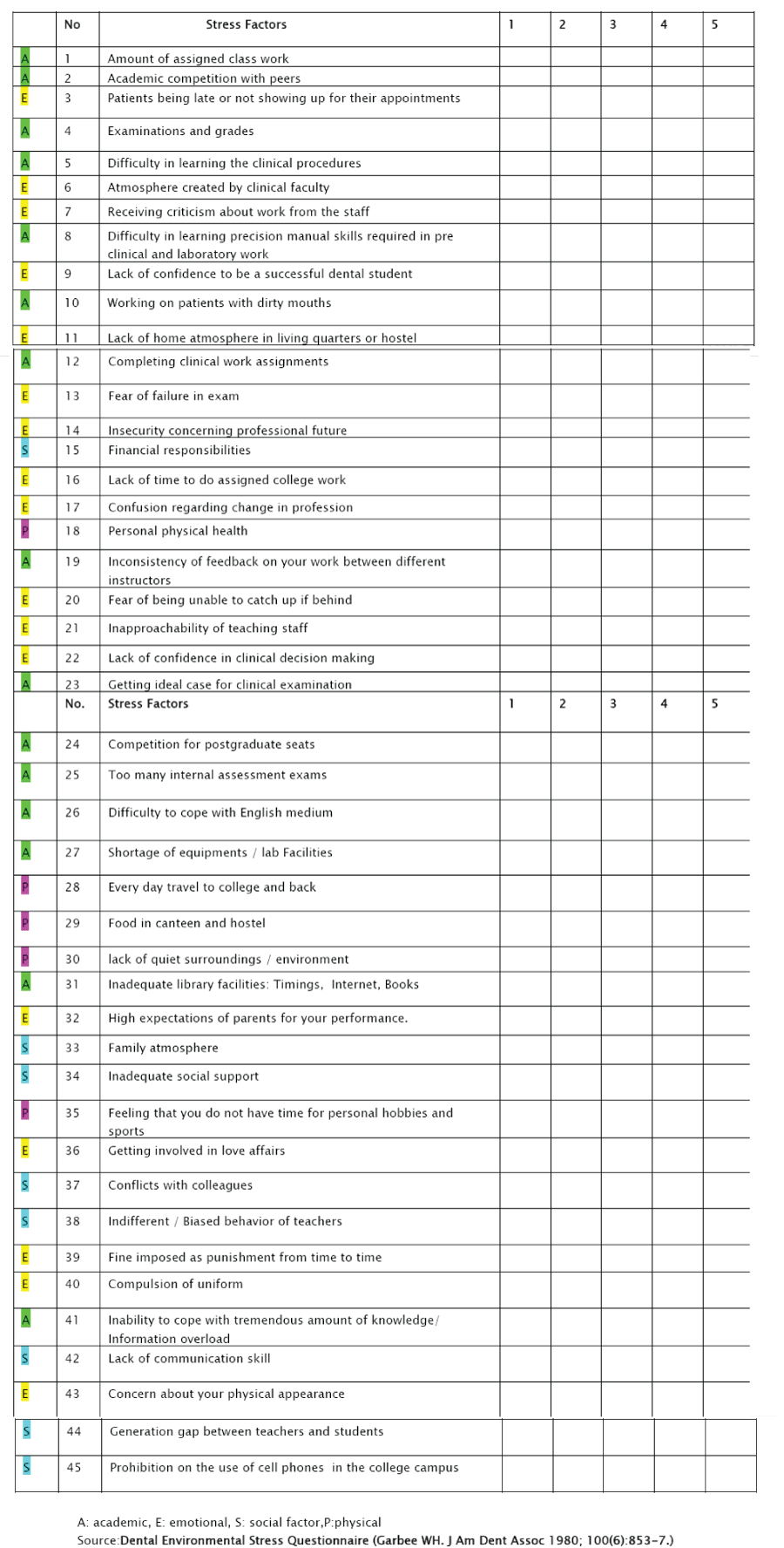
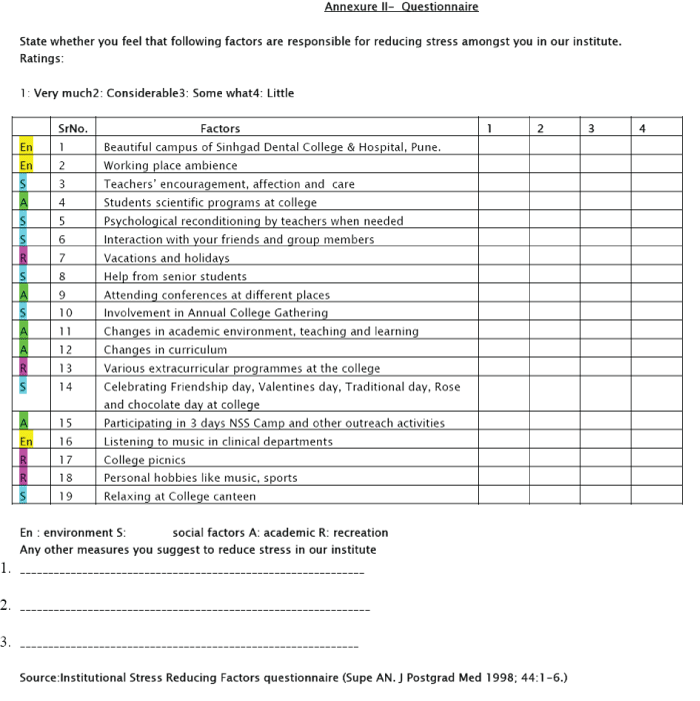
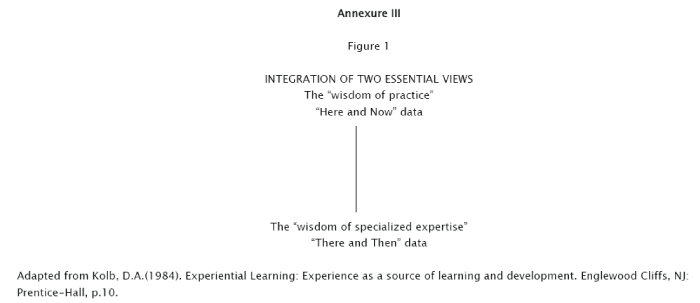
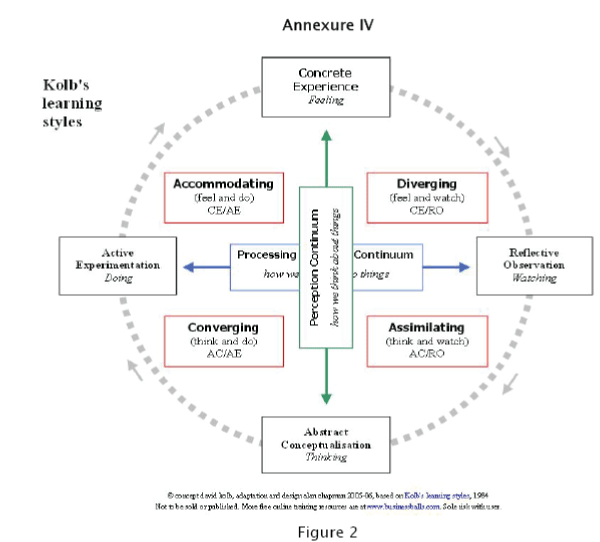
STRESS COPING SKILLS COURSE CONTENT: 13 module for BDS students
Module I – STRESS -Introduction to Stress ,Stress Continuum ,Overload and Stress, Burnout ,Stress , a Bio-Psycho-Social Response
Module II - Stress
• Determinants of coping , Good and Bad Stress ,Different Kinds of Stress, Balancing of Stress,
• Chronicity of Stress ,Good and Bad Stress ,Different Kinds of Stress, Balancing of Stress, Chronicity of Stress ,Different Kinds of Stress ,Balancing of Stress, Chronicity of Stress”
• Good and Bad Stress ,Different Kinds of Stress, Balancing of Stress, Chronicity of Stress
Module III – Physiology of Stress
• The Nervous System ,The Neuroendocrine system, Physiology of the Stress Response, Responses to stress ,Theories of Stress ,Stress : A Working Model
Module IV – Stress and Disease
• Cardiovascular Disease ,Hypertension ,Asthma, Backache, Rheumatoid arthritis, Headaches
• Diabetes mellitus ,Skin Ailments ,Obesity and Stress ,Peptic ulcers ,Stress and Negative Mood , Depression and Anxiety ,Cancer, Insomnia
Module V – Personality as a stress variable
• Types of personality ,Illness – prone personality ,Personality characteristics as moderators of stress response
Module VI – Source of stress
• Environmental stressors ,Personal stressors ,Domestic stressors, Stress at work, Caregiver stress ,Corporate Stress, Computer Stress ,Stress in the Social Environment, Age and Gender related Stress
Module VII – Health Damaging and health promoting behaviour
• Smoking ,Alcoholism ,Drugs, Eating ,Overwork
Module VIII – Health promoting Behaviour
• Exercise ,Healthy diet, Sleep ,Relaxation
Module IX – Cognitive
Assertiveness training ,A positive Attitude, Thought Stopping, Time management ,Conflict Resolution,, stress and productivity curve
Module X - Behavioural coping strategies
• Crisis and Change ,Goal Setting ,Coping in the Institute
• Dealing with work stress ,Lifestyle changes, Laughter
Module XI Relaxation systems
• The Relaxation – Meditation response ,Techniques of relaxation, Breathing ,Biofeedback
• Progressive muscular relaxation ,Autogenic relaxation, Visualization,
Module XII Meditation systems
• Methods of Meditation
• Schools of Meditation ,Transcendental meditation, Sahaja Yoga ,Zen Buddhism, Sufi meditation, Tai chi ,Osho Philosophy and Meditation, Vipassana, Yoga, Spirituality, Sleep
Module XIII
Behaviour Modification
• Operant conditioning ,Classical conditioning ,Cognitive Restructuring, Stress Inoculation Training, Observational Learning, Psychodrama
Before you embark on a program of change, it is important to consider how you are currently managing your stress. Instructions: Listed below are some common ways of coping with stressful events. Mark those that are characteristic of your behavior or that you use frequently.
_____ 1. I ignore my own needs and just work harder and faster.
_____ 2. I seek out friends for conversation and support.
_____ 3. I eat more than usual.
_____ 4. I engage in some type of physical exercise.
_____ 5. I get irritable and take it out on those around me.
_____ 6. I take a little time to relax, breathe, and unwind.
_____ 7. I smoke a cigarette or drink a caffeinated beverage.
_____ 8. I confront my source of stress and work to change it.
_____ 9. I withdraw emotionally and just go through the motions of my day.
_____ 10. I change my outlook on the problem and put it in a better perspective.
_____ 11. I sleep more than I really need to.
_____ 12. I take some time off and get away from my working life.
_____ 13. I go out shopping and buy something to make myself feel good.
_____ 14. I joke with my friends and use ho=umor to take the edge off.
_____ 15. I drink more alcohol than usual.
_____ 16. I get involved in a hobby or interest that helps me unwind and enjoy myself.
_____ 17. I take medicine to help me relax or sleep better.
_____ 18. I maintain a healthy diet.
_____ 19. I just ignore the problem and hope it will go away.
_____ 20. I pray, meditate, or enhance my spiritual life.
_____ 21. I worry about the problem and am afraid to do something about it.
_____ 22. I try to focus on the things I can control and accept the things I can”t.
Evaluate your results: The even-numbered items tend to be more constructive tactics and the odd-numbered items tend to be less constructive tactics for coping with stress. Congratulate yourself for the even-numbered items you checked. Think about whether you need to make some changes in your thinking or behavior if you checked any of the odd-numbered items. Consider experimenting with some even-numbered items you haven”t tried before.
-----------------------
*Adapted from the “Coping Styles Questionnaire.” © 1999 by Jim Boyers, Ph.D., Kaiser-Permanente Medical Center and Health Styles. Santa Clara, CA.
